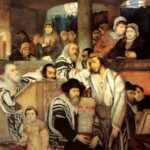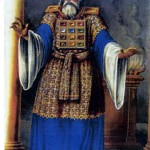Articles in Yom Kippur
Get Your Head in the Game

Get your head in the game is a common refrain among athletes. Distraction is the last thing athletes can afford. It interferes with their rhythm, disturbs their focus, and wreaks havoc on their stamina. Coaches are often overheard telling players to get their heads in the game.
Judaism is no different. …
Emor: The Shame Culture

A shame culture is one in which the individual is pressured to conform to the collective. Deviation from cultural norms is punishable by public shaming and ostracism. In a shame culture, people carefully groom their public personas—the image acceptable to the majority. A shame culture operates under the assumption that …
Yom Kippur: Remove the Muck

The Baal Shem Tov is said to have once heard a cantor confessing his sins on Yom Kippur to a joyful melody. The Baal Shem Tov asked him why he was so happy? The cantor replied that if he had the privilege to remove the garbage from the king’s palace, …
Acharei Mot: Yom Kippur

Yom Kippur is the holiest day of the Jewish calendar year. It is unusual to discuss Yom Kippur shortly after Passover, but it comes up this week because the Torah portion of the week describes the Yom Kippur service that was performed by the High Priest in the Holy of …
Re’e: The Missing Festival

The festival of Sukkot falls on the fifteenth of Tishrei, two weeks into the new Jewish year. Accordingly, the Torah tells us, in Exodus 34:22, to celebrate Sukkot at the turn of the year. However, there is a discrepancy. Eleven chapters earlier, Exodus 23:16 told us to celebrate Sukkot at …
Acharei Mot: Response to Tragedy

A Silent Response
During his inauguration to the High Priesthood, Aaron lost two sons. In response to tragedy Aaron was silent.[1] As High Priest, Aaron was permitted to enter the Holy of Holies on occasion, but only in silence – without bells on his tunic.[2] Silence seems to be thematic to …
Acharei Mot: G-d’s Space

The Holiest Day
The nation had pinned their hopes on two young men. Rising stars of the Levitic tribe, they were hailed as leaders of the next generation. Pious, righteous, passionate and devoted, Aaron’s eldest sons were expected to respectively succeed their illustrious father and uncle.
Tragedy struck. Like a bolt of …
Yom Kippur: Infinite Patience
Forgiving
If your best friend hurt you deeply and then asked for forgiveness, would you be able to forgive? What if you forgave and she came right back and hurt you again, would you forgive a second time?
What if you forgave her again, but she returned yet again to her hurtful …























